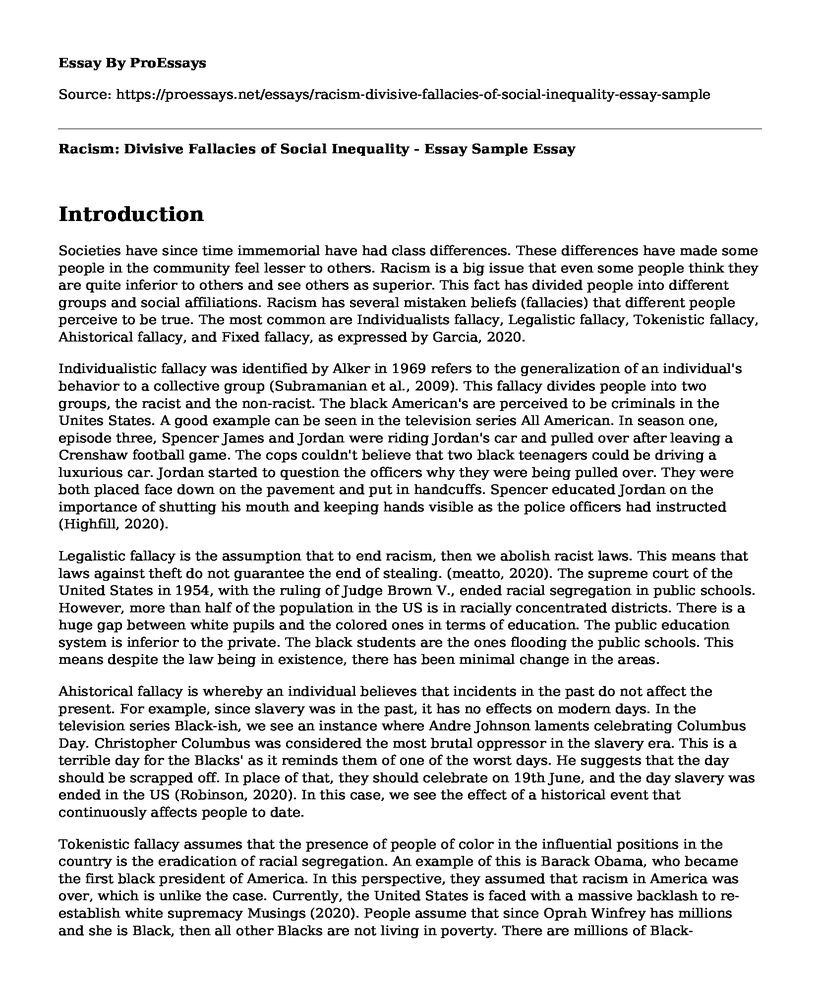Introduction
Societies have since time immemorial have had class differences. These differences have made some people in the community feel lesser to others. Racism is a big issue that even some people think they are quite inferior to others and see others as superior. This fact has divided people into different groups and social affiliations. Racism has several mistaken beliefs (fallacies) that different people perceive to be true. The most common are Individualists fallacy, Legalistic fallacy, Tokenistic fallacy, Ahistorical fallacy, and Fixed fallacy, as expressed by Garcia, 2020.
Individualistic fallacy was identified by Alker in 1969 refers to the generalization of an individual's behavior to a collective group (Subramanian et al., 2009). This fallacy divides people into two groups, the racist and the non-racist. The black American's are perceived to be criminals in the Unites States. A good example can be seen in the television series All American. In season one, episode three, Spencer James and Jordan were riding Jordan's car and pulled over after leaving a Crenshaw football game. The cops couldn't believe that two black teenagers could be driving a luxurious car. Jordan started to question the officers why they were being pulled over. They were both placed face down on the pavement and put in handcuffs. Spencer educated Jordan on the importance of shutting his mouth and keeping hands visible as the police officers had instructed (Highfill, 2020).
Legalistic fallacy is the assumption that to end racism, then we abolish racist laws. This means that laws against theft do not guarantee the end of stealing. (meatto, 2020). The supreme court of the United States in 1954, with the ruling of Judge Brown V., ended racial segregation in public schools. However, more than half of the population in the US is in racially concentrated districts. There is a huge gap between white pupils and the colored ones in terms of education. The public education system is inferior to the private. The black students are the ones flooding the public schools. This means despite the law being in existence, there has been minimal change in the areas.
Ahistorical fallacy is whereby an individual believes that incidents in the past do not affect the present. For example, since slavery was in the past, it has no effects on modern days. In the television series Black-ish, we see an instance where Andre Johnson laments celebrating Columbus Day. Christopher Columbus was considered the most brutal oppressor in the slavery era. This is a terrible day for the Blacks' as it reminds them of one of the worst days. He suggests that the day should be scrapped off. In place of that, they should celebrate on 19th June, and the day slavery was ended in the US (Robinson, 2020). In this case, we see the effect of a historical event that continuously affects people to date.
Tokenistic fallacy assumes that the presence of people of color in the influential positions in the country is the eradication of racial segregation. An example of this is Barack Obama, who became the first black president of America. In this perspective, they assumed that racism in America was over, which is unlike the case. Currently, the United States is faced with a massive backlash to re-establish white supremacy Musings (2020). People assume that since Oprah Winfrey has millions and she is Black, then all other Blacks are not living in poverty. There are millions of Black-American's living in poverty Garcia, S. The presence of a few iconic people in power does not change the narrative of the others who are suffering.
Fixed fallacy views racism as a measurable commodity. In this context, the assumption that one type of racism has decreased then it has reduced racism in general. In the television series Warrior, we are given the storyline of how the Chinese came to the US in the 1800s to look for jobs. When they arrived, they are traded as slavery. They all live in a Chinese slum "Chinatown" which is filthy and full of problems. The Chinese are not allowed to mingle with the other races. There is a growing anti-Chinese sentiment among the white police and politicians (Nguyen, 2020). The story is related to how Chinese radicalized to date. Racism does not develop or change over time. It is either in existence, or it has been eradicated.
References
Garcia, S. (2020). 5 Fallacies of Racism. Retrieved 7 March 2020, from https://padlet.com/stephanie3dg/f5hjenjkifkv
Highfill, S. (2020). 'All American' tackles police bias and the 'ugly side of being a black man in America.' Retrieved 7 March 2020, from https://ew.com/tv/2018/10/24/all-american-episode-3-police-bias/
meatto, k. (2020). Still Separate, Still Unequal: Teaching about School Segregation and Educational Inequality. Retrieved 7 March 2020, from https://www.nytimes.com/2019/05/02/learning/lesson-plans/still-separate-still-unequal-teaching-about-school-segregation-and-educational-inequality.html
Musings, R. (2020). Fallacies about Racism - Rachel's Musings. Retrieved 7 March 2020, from https://www.rabe.org/fallacies-about-racism/
Nguyen, H. (2020). 'Warrior' Review: Bruce Lee's Vision of Chinese in the Old West Comes to Rowdy, Violent Life on Cinemax. Retrieved 7 March 2020, from https://www.indiewire.com/2019/04/warrior-review-bruce-lee-cinemax-1202056366/
Robinson, B. (2020). Retrieved 7 March 2020, from https://www.washingtonpost.com/news/arts-and-entertainment/wp/2017/10/04/blackish-gives-a-powerful-history-lesson-with-nods-to-hamilton-and-schoolhouse-rock/
Subramanian, S. V., Jones, K., Kaddour, A., & Krieger, N. (2009). Revisiting Robinson: the perils of individualistic and ecologic fallacy. International journal of epidemiology, 38(2), 342-360.
Cite this page
Racism: Divisive Fallacies of Social Inequality - Essay Sample. (2023, Apr 20). Retrieved from https://proessays.net/essays/racism-divisive-fallacies-of-social-inequality-essay-sample
If you are the original author of this essay and no longer wish to have it published on the ProEssays website, please click below to request its removal:
- Research Paper on Gay Marriage as a Controversial Issue in America
- Ethical Dilemmas That Could Arise in a Diabetes Advocacy Campaign, and How You Could Manage It?
- The Male Gaze: The Perception of Men and Women Essay
- Theme of Discrimination in Short Stories - Essay Sample
- Drug Abuse: A Decades-Long Battle With No Victory Yet - Essay Sample
- Young Adults: At Critical Risk for Alcohol & Drug Use - Essay Sample
- Paper Example on 5 Steps to Effectively Use CR in Organizations







